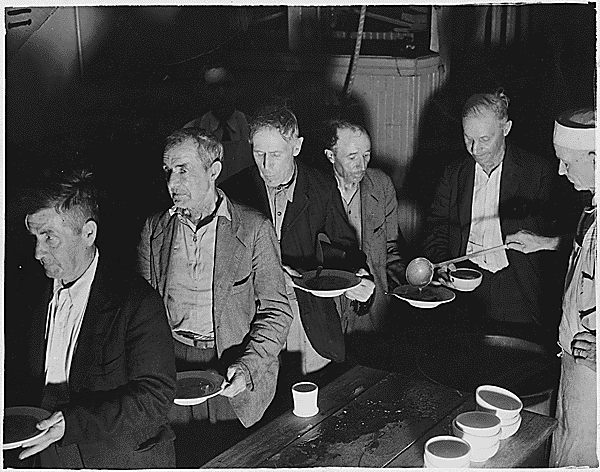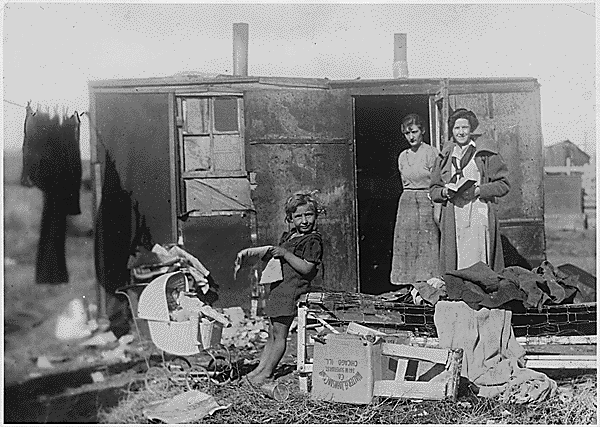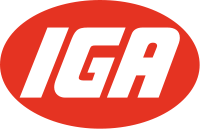Imagine America during the Great Depression. There was virtually no federal social safety net then!
 While there has been suffering in the U.S. in what many call our recent "Great Recession" which began circa 2008, let's be honest. The great Depression days were far worse.
While there has been suffering in the U.S. in what many call our recent "Great Recession" which began circa 2008, let's be honest. The great Depression days were far worse.
This pair of photos from WikiCommons might help someone not familiar with the Great Depression begin to understand how tough it was then, versus now.
Soup lines, rough housing, jobs were hard to find and low paying.
It was in this sad economic environment – far more challenging than what we've had since 2008 – that IGA was formed. Let's see what lessons for manufactured housing professionals in organizations of any and all sizes the IGA story may hold.

Wikipedia states the following about IGA, which is short for Independent Grocers Alliance.
 "IGA is a brand of grocery stores active in more than 30 countries. Contrasting with the chain store business model, IGA operates as a franchise through stores that are owned separately from the brand. Many of these stores operate in small town markets and belong to families that manage them. It was founded in the United States as the Independent Grocers Alliance. The headquarters are in Chicago, Illinois."
"IGA is a brand of grocery stores active in more than 30 countries. Contrasting with the chain store business model, IGA operates as a franchise through stores that are owned separately from the brand. Many of these stores operate in small town markets and belong to families that manage them. It was founded in the United States as the Independent Grocers Alliance. The headquarters are in Chicago, Illinois."
"IGA was started in May 1926 when a group of 100 independent retailers in Poughkeepsie, New York, and Sharon, Connecticut, led by J. Frank Grimes, organized themselves into a single marketing system. This group quickly expanded, and by the end of the year there were more than 150 IGA retailers. In 1930 there were over 8,000 grocery stores using the IGA name. The company uses the "Hometown Proud Supermarkets" slogan. Today, many IGA grocery stores are still located in smaller cities and towns throughout the United States."
IGA is not the powerhouse today that it once was, for a variety of reasons. But for decades, IGA grew rapidly and often dominated the landscape in the huge grocery business. It provided marketing, savings and other benefits to its associated grocers, so it paid to be a member of IGA.
In manufactured housing today, there are several 'buyers groups' that offer its members specific advantages, including lower costs on homes through volume rebates and/or other discounts.
We also have state and national associations, which offer a different range of benefits that include networking, educational and political lobbying.
What we don't have – yet – is a similar, formal alliance for MH akin to what IGA was for grocers. Thanks to the Internet and modern technology, that can now rapidly change in a way that would benefit all involved.
How can this model be applied to the manufactured housing Industry successfully today?
MHRetailers, MHCommunities, MH Associations, factories and service providers – Come to the Louisville Show in 2015 and see!
Your operation may be soaring, struggling or somewhere in between. You may be starting up in business, or ready to wide down.
Whatever your status, your business is worth more – duh! – when it is profiting more.
Learn how the successful IGA model can be applied to Manufactured and Modular Home sales at the 2015 Louisville Manufactured Housing Show. Yours truly will show you how we can grow your business and others, the smart way.
As an MH retailer, community or builder/developer, odds are excellent you can enter the show free.
Please see the Louisville show website for details and to pre-register free. Some 2,500 industry pros came to Louisville in 2014, far more than any other industry event! There are good reasons the crowd keeps growing. We hope you will come and see why the Road to Success starts in Louisville. Free pre-registration link is here. ##
(Great Depression Image Credits: WikiCommons)

.png) by
by